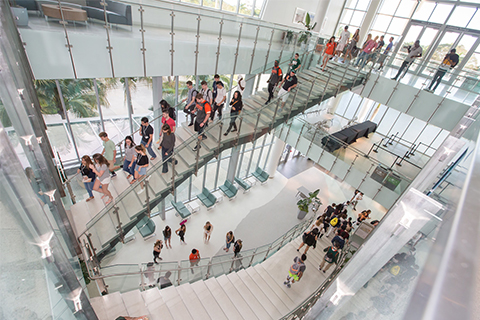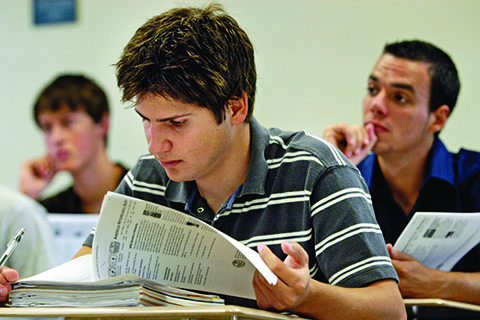Faculty Information For Accommodating Students In Online Courses
Our current situation is unprecedented, and it is with your support that we will be able to ensure academic continuity for our students. Below is information to assist in this regard.
Accommodation Request Process
Under the ADA, the University must make reasonable attempts to ensure online/remote/distance learning courses are accessible to individuals with disabilities. The process for requesting accommodations remains the same:
- Students have the responsibility to self-disclose and request accommodations through the Office of Disability Services.
- Each student with approved accommodations must present the Professor Memo to faculty with fair notice prior to needing or using the accommodation.
Types of Accommodations
Below are some common accommodations along with recommendations to meet accommodation requests in an online/remote/distance learning environment.
Testing Accommodations
- Extended Time on exams - This accommodation will continue to apply for any timed assessments administered virtually. This does not apply to papers, projects, or longer take home exams. Any exam hosted in Blackboard allows the time limit to be adjusted per student to allow for different stop times.
Instructions on extending exam time in Blackboard:
- Go to Test Options
- Go down to Test Availability
- Add Users by clicking to download all students on the class roster
- Select the students with extended time
- Adjust the amount of minutes in the box next to their name.
- Distraction Reduced testing location - It is up to the student to identify a location that minimizes distractions before starting an exam.
- Use of computer - Online/remote/distance learning courses inherently use the computer and further coordination by the professor is not necessary.
- Assistive Technology - This accommodation allows for the use of specialized equipment to augment a student’s hands or control of the mouse. Students with these accommodations were already using specialized equipment through the Office of Disabilities and will have access to this same equipment by using their own computer or equipment. This is a very small group of students and in most cases, will not require faculty to make any adjustments to their course.
Other Accommodations
- Screen Magnification - Blackboard is compatible with most vision assistive technology software used by individuals with a vision impairment. Examples include using screen reader software or screen magnification software. Faculty with students who have been granted screen magnification assistive technology should be in touch with the Office of Disability Services as soon as possible.
- Video Captioning - This provides a written transcript of any lectures or videos for students with hearing impairments. UMIT has enabled this feature at the University level for Zoom videos. For students with hearing impairments, the Office of Disabilities is coordinating captioning via a remote captioning transcription vendor and will continue these services. Any faculty receiving a request for captioning of their course content should direct students to the Office of Disability Services as soon as possible.
- Communication disorders - Students who struggle with written communication may have difficulty expressing questions or ideas through writing. The virtual teaching environment can rely heavily on strong writing skills. To help these students, faculty can offer a variety of communication methods that include email, phone calls, or video chats. Offering these options will make sure students with written communication deficits are not at a disadvantage in the online learning environment.
Other Suggestions
Professors can do the following to make online content accessible to all students:
- Closed caption or a text transcription for video content, audio files, or course lectures.
- A written transcription and general description for photos and graphics displayed in course material.
- A standard file format for all documents posted within a course.
- A list of compatible file formats for documents accessed by link or uploaded by instructor.
- PowerPoint presentations and graphics in standard colors, fonts, and high/low contrast colors for the visually impaired.
Communication About Accommodations
Engaging in a conversation about a disability can be challenging via email. A few things can make this easier for students:
- Include a statement in your syllabus that students must follow the same process of notifying you 7 days prior to an exam if they intend on using their accommodations for any online tests/quizzes.
- The policy should be advertised and posted in the course management system, Blackboard.
- Instructors teaching online/remote/distance courses should communicate with students via phone to discuss more personal matters related to a disability.
Unique Circumstances
There may be specific accessibility issues that are not defined by the ADA because they are unique to an individual’s condition. Faculty should direct these students to the Office of Disabilities where our team will review the request and determine reasonable accommodations on a case-by-case basis.
If you or your students have any questions or concerns related to accommodations please email disabilityservices@miami.edu. Our team is here to provide support for students
The Office of Disability Services (ODS) provides academic accommodations and support to ensure that students with disabilities are able to access and participate in the opportunities available at the University of Miami. Individuals with disabilities must request academic accommodations through the Office of Disabilities Services. Accommodations are determined on a collaborative and case-by-case basis and are based on the documentation provided by the individual. ODS staff will work collaboratively with students to determine what academic adjustments and educational auxiliary aids are reasonable to ensure that students with disabilities are not subject to discrimination. All documentation is reviewed and accommodations are assigned in accordance with Section 504 of the Rehabilitation Act of 1973 and the Americans with Disabilities Act of 1990 (ADA), including the Americans with Disabilities Amendments Act of 2008.
Under the Americans with Disabilities Act (ADA) of 1990, Americans with Disabilities Amendments Act of 2008, and Section 504 of the Rehabilitation Act of 1973, qualified individuals with disabilities are protected from discrimination and may be entitled to reasonable accommodations and/or equal access to programs and services. The University of Miami follows and abides by the definition of disability set forth in the foregoing statutes. In determining whether a person is a qualified individual with a disability, the University of Miami does not take into consideration the ameliorative effects of mitigating measures other than ordinary eyeglasses or contact lenses.
Information is available to prospective and enrolled students, their parents and/or sponsors. The Office of Disability Services (ODS) is located in the Camner Center for Academic Resources in Whitten University Center 2400. ODS staff can be reached at 305-284-2374 (Voice) or 305-284-1999 (Fax). Office hours are 8:30 am to 5:00 pm, Monday through Friday. Individuals may email the office staff for quick responses to questions.






